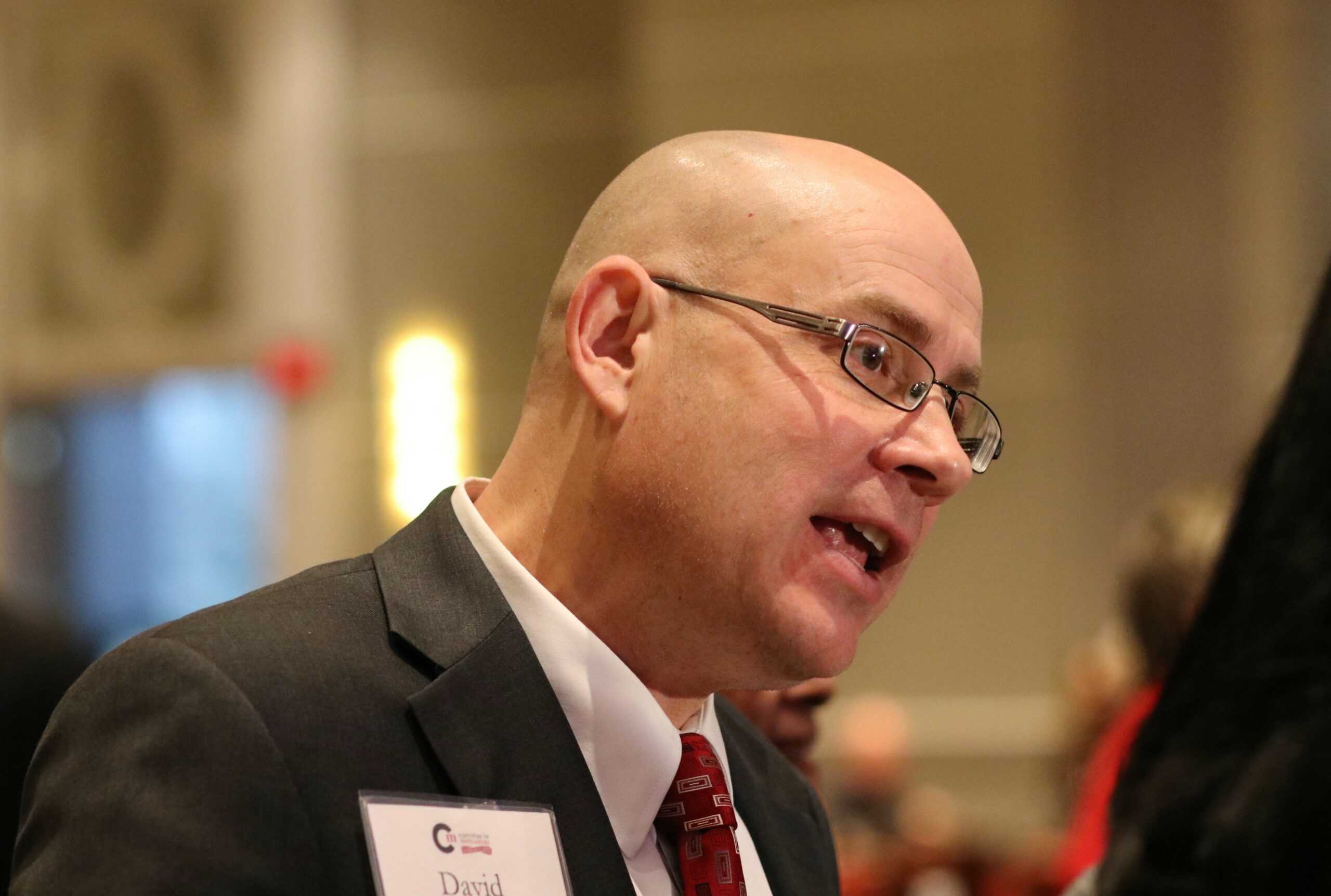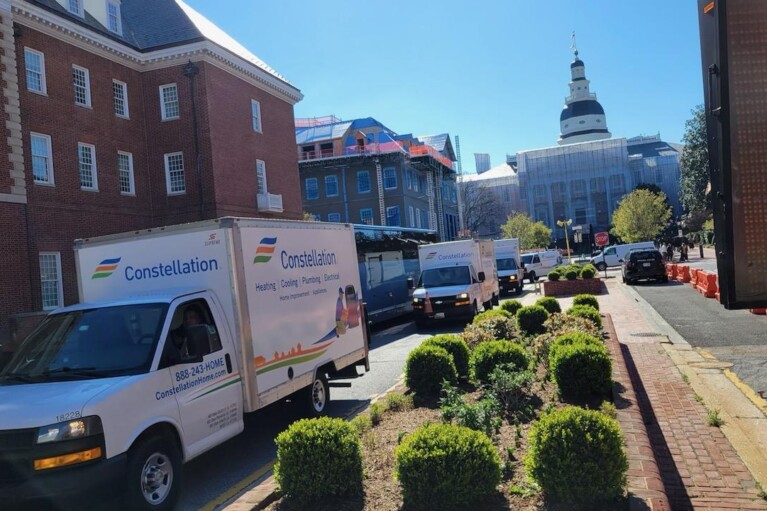Lawmakers Eye Carbon Fee from Polluters to Pay Part of Kirwan Tab

Carbon-cutting legislation will be back in the General Assembly for the third year in a row, House and Senate sponsors said Tuesday, with an ambitious goal: zero greenhouse gas emissions by the year 2040.
“Our Children’s Future Act” would require polluters to pay for their greenhouse gas emissions, and would invest that revenue — projected at $880 million in the first year and $1.74 billion by the 10th year — into clean energy and education.
“When we look at the crisis that is before us, this is not what we can or should do, this is something we have to do,” Del. David Fraser-Hidalgo (D-Montgomery), the bill’s lead sponsor in the House, said at a news conference Tuesday. “We need to stem, stop and reverse the damage that’s been done.”
Sen. Benjamin L. Kramer (D-Montgomery), the Senate sponsor, said Marylanders have been paying for pollution and climate damage — and that should change.
“Visits to the doctor’s office, visits to the hospital, heart diseases, lung disease, asthma … the destruction of the environment is the price we have been paying for the fossil fuel industry’s profits,” he said.
Most of the time, the most vulnerable end up taking the brunt of those costs, said Del. Lorig Charkoudian (D-Montgomery). “It’s the way environmental injustice works.”
Charkoudian said making companies responsible for these consequences will push them to produce less fossil fuel.
Maryland, with about 3,100 miles of tidal shoreline, is among states most vulnerable to sea-level rise associated with climate change.
Last year, the Maryland General Assembly passed an emergency appropriation for $1 million to mitigate flooding in Annapolis, just one of many Maryland cities that is jeopardized by rising sea levels.
“Why should the taxpayers pay for that?” Fraser-Hidalgo asked.
Companies would be charged a carbon collection fee for their pollution — $15 per metric ton of carbon dioxide from combustion of non-transportation fossil fuels. The cost would rise $5 each year, to a cap of $60 per metric ton.
Depending on how energy companies respond, the bill could increase the price of gasoline by 9 cents per gallon, then by 3 cents each year, according to estimates from Climate Xchange, a research and advocacy organization.
It could increase standard electricity by 0.9 cents per kilowatt-hour, then by 0.3 cents each year. Maryland residents who choose clean energy sources for electricity would pay less.
The measure could also increase the price of natural gas by 53 cents per hundred cubic feet, then by 18 cents each year. It could increase the price of heating oil by 12 cents per gallon, then by 4 cents each year.
But lawmakers note that those figures are only estimates, not a definitive look at how energy companies might respond to the legislation.
Low-income residents would not pay more for electricity, natural gas or heating oil and moderate-income residents would see “small” increases, advocates for the bill insisted.
A separate “gas guzzler fee” would be charged on sales of new high-polluting (those that produce 40 tons of carbon dioxide over a 10-year life) vehicles. The fee would begin at $400 and increase by $10 for every ton of carbon dioxide above 40 tons that the vehicle would emit over 10 years.
From the revenue generated, 40% of proceeds would be directed back to low- and moderate- income families to protect them from financial harm. The bill also would direct 10% of revenue to protect energy-intensive, trade-exposed businesses from financial harm, $350 million to education each year, and the rest would be spent on various measures toward a transition to clean energy.
Over the next decade, the act would direct $4.8 billion in initiatives to address climate change, such as investing in public transportation and strengthening infrastructure.
The $350 million annually directed at education would help fund improvements mandated by the Kirwan initiative, including increasing teacher salaries, improving student career preparation and hiring more counselors and health professionals in schools.
“Today’s youth are tomorrow’s scientists,” Fraser-Hidalgo said. “And tomorrow’s scientists are going to have to be really, really well educated. We’re going to have to spend a lot of money and a lot of resources to undo and fix what it is that past generations, including ours, have done.”
“There is a great need to find a solid funding source to move the Kirwan initiatives forward,” Kramer said. “This is a solid funding source.”
Maryland Democrats are more confident the bill will move forward this year, in part, because the latest proposal is much simpler.
Kramer said bills in 2018 and 2019 were complex, heavy pieces of legislation that attempted to include a roadmap to reach greenhouse gas reduction.
“We concluded that maybe that wasn’t the ideal way to approach it,” Kramer said.
This session’s legislation would create a “Climate Crisis Council” comprised of experts charged with developing a policy plan to meet the greenhouse gas reduction goals.
“That shifts much of the complexities now to the scientists and the economists and the health experts to give us that roadmap to get there,” Kramer said. “Instead of us trying to do it in the legislation, we are turning it over to the experts.”
Fraser-Hidalgo said that he is also optimistic that the bill will pass because many new delegates are ready to act to confront climate change.
“They understand climate change is real, they understand we’re in a crisis,” he said. “They want to move forward, and they want to move forward quickly.”
“It’s a win for our health, it’s a win for the environment and it’s a win for education,” Kramer said. “It’s giving our children the necessary tools to fight the climate crisis that we have created.”
This story has been updated to reflect that the proposed carbon fees are not a tax and that the potential cost on consumers’ energy bills are only estimates.



 Creative Commons Attribution
Creative Commons Attribution